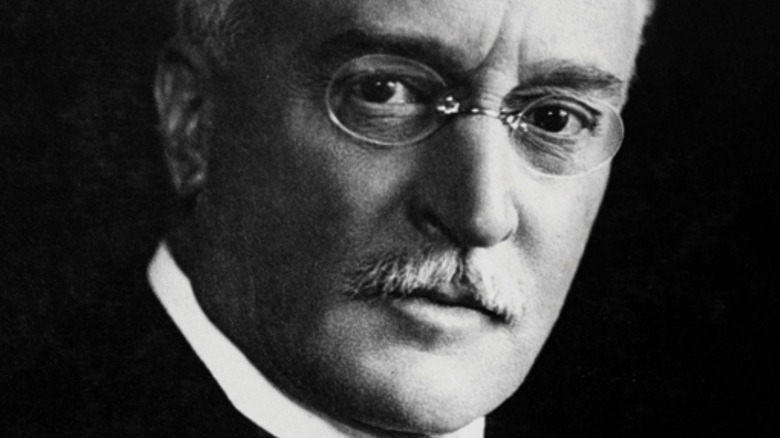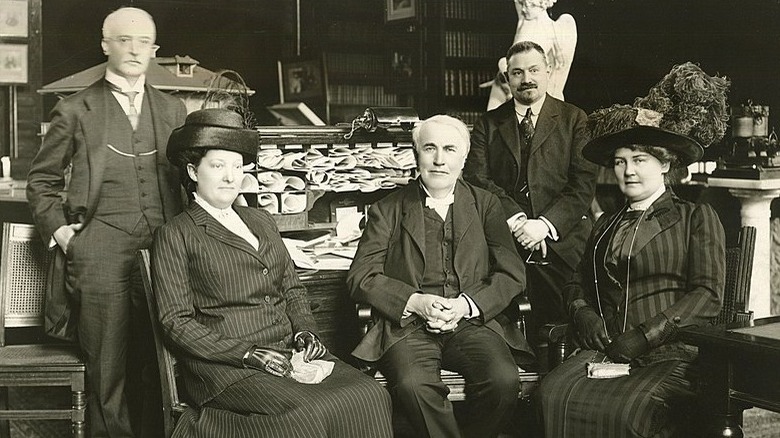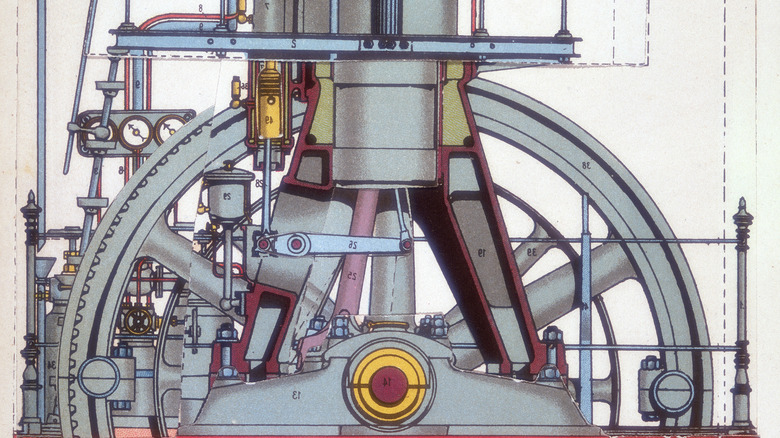The Mystery Of Rudolf Diesel's 1913 Death
In 1892, Rudolf Diesel patented an invention that shares his name and changed the world; the diesel engine (via Britannica). ThoughtCo. writes that he began his career as a refrigerator engineer but he soon set his sights on creating an engine that was second to none. The BBC explains that prior to his invention, steam engines were the norm. They only converted 10% of heat, however, and were vastly inefficient. Of course, there were also gas engines, but those were just as deplorable (per Smithsonian Magazine). That being said, Diesel went on to create a machine that was simple and lightweight.
History reports that Diesel's engine did not need an ignition system. Instead, the engine compressed air, leading to a high amount of heat igniting the fuel (via the BBC). Moreover, Smithsonian Magazine states, he designed it to run on various types of fuels. Per Lemelson-MIT, the diesel engine ran with a theoretical efficiency of 75%, in comparison to a traditional steam engine's 10%, and quickly transformed the Industrial Revolution. This made Diesel a very wealthy man, as his invention was being used to power cars, mines, and much more. Then on September 29, 1913, Diesel vanished while on a steamship called the "Dresden," while traveling from Belgium to England.
His death was ruled a suicide
The Lineup writes that on the evening he went missing, Diesel (standing, left, with Thomas Edison, seated, in 1912) made his way to his room at 10 p.m. This would be the last time that he was seen alive. Time states that when the ship arrived in England, Diesel never made it off board. In fact, he never even made it to his room; his nightclothes were on his bed but it was clear that they had not been slept in (via the BBC). What, then, had happened to Diesel? Family and friends theorized that he had fallen overboard or that he had killed himself. As ThoughtCo. explains, Diesel was in serious debt from bad investments and was having health issues.
Some 11 days after his disappearance, Diesel's body was found at sea by a Belgian sailor (per History). However, Time reports that although the body was identified as Diesel, there has been speculation that the remains were not his. The body was heavily decomposed but Diesel's son was adamant that it was indeed his father (via The Lineup).
According to the BBC, the son said that a wallet and knife found on the body were owned by Diesel. Whatever the case, it was concluded that Diesel had killed himself. Eerily, his diary had an X marked on the date for September 29, 1913. Additionally, it's reported that before he left for England, Diesel gave his wife a bag full of money and documents that proved how deep in debt he was.
Was he murdered?
Despite this conclusion, Smithsonian Magazine writes, many believe that Diesel was the victim of foul play. Time reported that "in 1913 things were going fairly well" for the German inventor (via ThoughtCo.). History explains that one reason Diesel was traveling to England was to discuss the possibility of installing his engines on British submarines. (French submarines were using diesel engines by 1904.) Perhaps he was murdered by German spies who did not want him to work with the British. Per the BBC, one newspaper seemed to agree with this presumption and wrote a headline that read: "Inventor thrown into the sea to stop sale of patents to British government."
Others think that his death was at the hands of a business rival (per Time). According to Lemelson-MIT, it's theorized that Diesel was murdered by those in the coal industry. His engine, after all, meant that coal was out. This was undeniably a blow to the industry. The BBC notes that prior to his death, Diesel had implied that peanut and vegetable oil were the future. This led to another headline that stated that he had been "Murdered by agents from big oil trusts." Some have suggested that Diesel never died; he simply faked his own death (via The Lineup). There were later rumors that he inventor was living in Canada. Speculation aside, Diesel's true fate remains unknown.


